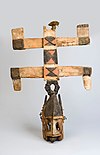
Back Houngan Catalan Houngan German Houngan Spanish Houngan Finnish Houngan French Oungan HT Oungan Italian 호웅간 Korean Houngan Polish Hungã Portuguese
| Haitian Vodou Priest Oungan | |
|---|---|
| Leader in Haitian Vodou | |
 Oungan ceremony ritual | |
| Location | Haiti |
| Religious origins | Dahomey (present day Benin Republic) |
| Parent tribe | Fon |
| Language | English, French, Fon, Creole |
| Religion | Haitian Vodou |
| Part of a series on |
| Traditional African religions |
|---|
 |
Oungan (also written as houngan) is the term for a male priest in Haitian Vodou (a female priest is known as a mambo).[1] The term is derived from Gbe languages (Fon, Ewe, Adja, Phla, Gen, Maxi and Gun). The word hounnongan means chief priest. Hounnongan or oungans are also known as makandals.[2]
Haitian Vodou is an African diasporic religion, which blends traditional Vodun from the Kingdom of Dahomey with Roman Catholicism. In similarity to their West African heritage, oungans are leaders within the community who run temples (ounfò) to respect and serve lwa (also written as loa) alongside the Grand Maître (grandmaster or creator).[3] Lwa are like spirits, encompassing a collection of Yoruba gods and Roman Catholic saints. Lwa manifest themselves in people during Vodou ceremonies through spirit possession. Each lwa has a distinct dance rhythm, song, sacrificial victuals, and clothing.[4] Lwa choose oungans whilst they dream, where they are instructed by the gods of the Vodun to be their servants in the mortal world.[5] It is the oungan's role to preserve rituals and songs, maintaining and developing the relationship between the spirits and the community as a whole.[6] oungans are entrusted with leading the service of all of the spirits of their lineage, performing rituals for the community - death and marriage ceremonies; healing rituals; initiations for new priests (tesses); creating potions and casting spells; and dream interpretations.[7] Sometimes they may also be bokor (sorcerers).
Dutty Boukman was a oungan known for sparking the Haitian Slave Revolt of 1791, working together with Cécile Fatiman to inspire and organise the slaves for the revolution. Other notable oungans include artist Clotaire Bazile, professor Patrick Bellegarde-Smith, and Don Pedro venerator of the Petro lwa.
- ^ Corbett, Bob. "Introduction to Voodoo in Haiti". Archived from the original on 6 October 2011. Retrieved 14 October 2011.
- ^ Claudine, Michel; Bellegarde-Smith, Patrick (2006). Vodou In Haitian Life and Culture. Palgrave Macmillan.
- ^ Wexler, Anna (1997). "An Interview with Clotaire Bazile". Callaloo. 2 (2): 383–398.
- ^ Fleischhack, Maria; Schenkel, Elmar (2016). hosts - or the (Nearly) Invisible: Spectral Phenomena in Literature and the Media. Peter Lang AG.
- ^ Simpson, George, Eaton (1940). "Haitian Magic". Social Forces. 19 (1): 95–100. doi:10.2307/2570849. JSTOR 2570849.
{{cite journal}}: CS1 maint: multiple names: authors list (link) - ^ Stephen, Finley; Guillory, Margarita Simon; Page, Hugh R. (2014). Esotericism in African American Religious Experience (19 ed.). Brill.
- ^ Seraphin, H; Nolan, E (2014). Rituals and traditional events in the modern world. Routledge.
© MMXXIII Rich X Search. We shall prevail. All rights reserved. Rich X Search